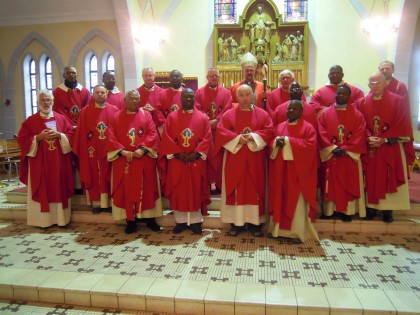
South Africa Hosts Seminar on Christian Spirituality
Fr. Peter Surdel, SCJ, provincial superior of the South African Province, shared news about the first of what is hoped to be a continuing series of seminars on Christian Spirituality.
“The idea for the seminar arose from the fact that the dioceses of Aliwal and De Aar are far from the large cities where on-going courses in formation and spiritual enrichment can be more easily found,” said Fr. Peter. “Fr. Chris Grzelak, our on-going formation director, organized the gathering.” Fr. Chris hopes that such seminars will continue on a yearly, or even more frequent basis.
The day-long gathering, held September 21 at the Cathedral Hall in Aliwal North, “was more academic rather than spiritual,” said Fr. Peter. “It provided sound information on some of the basic issues of spirituality to help participants develop their own spiritual life and experience a deeper vision of God.”
Fr. Chris assembled a group of six presenters; most were SCJs. They were joined by Sr. Leoncienne LaBonté, OP, a lecturer and colleague of Fr. Chris’s at St. Joseph’s Theological Institute in Cedara (students in the SCJs’ pan-African formation program in Pietermaritzburg study at St. Joseph’s).
The topics included:
The meaning and practice of spirituality in Christian life
Fr. Chris spoke about the meaning of spirituality in the life of religious and priests, and examined various misconceptions about spirituality. He reflected on the characteristics of contemporary spirituality, which he said “should be non- dualistic, post-patriarchal, holistic and ecological.” He also spoke about the interconnected relationship of prayer and practice “as shown to us in the two-fold commandment of Jesus to love God and neighbor.” Closing, he looked at the diverse types of spirituality found within the Christian tradition.
Contemplative living
Contemplative living, stressed Sr. LaBonté, is the call to live reflectively both in and with Christ. To be contemplative is to be grounded in Christ, to listen to and imitate Christ. She noted that Jesus lived a contemplative life that flowed into action. She gave the examples of Sr. Teresa of Avila and St. John of the Cross as people who had lived contemplatively.
Religious and priestly life lived in a prophetic way in our society today
Fr. Innocent Mabheka, SCJ, spoke of what it is to be a “prophet” today. He reflected on materialism and individualism, noting that materialism happens when a person is possessed by the material world. Individualism often goes hand in hand with this, as the more consumed a person becomes with material goods the less he or she is concerned with the common good of all.
He also explored issues of rationalism and sexism. Fr. Innocent suggested that morals often get set aside when much in society is rationalized. “How,” he asked, “can we be prophetic, in a practical way, in light of this?”
Vocation ministry in the South African context
Fr. Adam Maslowski, SCJ, vocation director since 2007, reflected on vocation ministry in South Africa. The SCJs and other religious communities are focusing their efforts primarily in the Kwazulu-Natal Province, where the SCJs’ formation program is based. Together, religious communities have developed collaborative vocation materials including a brochure, poster and CD. Fr. Adam shared clips from the CD, which were well-received.
Jesus Christ: the perfect model for religious and priests today
The two youngest members of the province gave the final presentations. Fr. Ntsikelelo Bambatha, SCJ, spoke about the challenges of being a priest today. Just as Jesus, priests today are called to “move out of our comfort zones and minster to people,” he said. “We are also called to be ‘living Scriptures.’” This can only be done, he added, by “living intimately with God.”
Priests, he concluded, are called to “be the manifestation of God’s love in society and their parishes.”
Ubuntu: respect for humanity and especially the elderly
Fr. Joshua Mpiti, SCJ, spoke of the concept of “Ubuntu,” which is an African word that speaks of the “very essence of the human being.” He gave examples of how that is developed by being generous, friendly, concerned about others, affirming of others and compassionate. It is a way of being accountable to society as a member of that society.
“Umuntu ngumuntu ngabantu,” is the African saying, meaning, “a person is a person through other persons.”
A new tradition
Approximately 30 people took part in the seminar. Diocesan priests and religious sisters joined SCJs from the Aliwal and De Aar Dioceses. Lay people will be encouraged to take part in future gatherings.
Bishop Michael Wuestenberg of Aliwal opened and closed the gathering, and served as the main celebrant of the day’s Eucharistic celebration.
“It’s the start of what we hope to be regular tradition for our province and the two dioceses,” said Fr. Peter.
The United States is one of the two “mother provinces” of the South African Province, the other being Germany. Many of the SCJs serving in South Africa are alumni of Sacred Heart School of Theology’s ESL program. Several American SCJs have also served in the country, including Fr. John Strittmatter, who has spent most of his years of ordained ministry there, and Bishop Joseph Potocnak, retired bishop of De Aar. Also, several Americans have taught at St. Joseph’s Theological Institute, the school of theology where students in the SCJs’ pan-African formation program in Pietermaritzburg do their theological studies.
